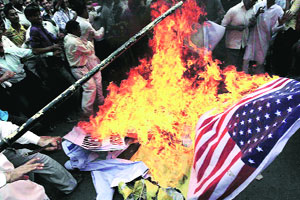Asias Revolt against Empire
Pankaj Mishras new book is a provocative read with a deeply flawed worldview its the West versus the rest

Book: From the Ruins of Empire
Author: Pankaj Mishra
monthly limit of free stories.
with an Express account.
Publisher: Penguin / Allen Lane
Price: 20 pounds
Pages: 368
It would be wrong to see the re-making of Asia,much less India,as a revolt against the West. Asia has indeed been re-built on the ruins of colonialism,but not on the ruins of all that the West has come to represent. Asked in 1931,at Oxford,how far would he cut off India from the Empire,Mahatma Gandhi replied: From the Empire,completely; from the British nation not at all,if I want India to gain and not grieve.
So I have a problem with Pankaj Mishras title,and the premise it is derived from. This does not mean I would not recommend the book for a reading. It is well written. There is scholarship in it,based on a reading of interesting texts and speeches spanning Muslim and Chinese Asia as well as some reading of Indian thinkers,especially Rabindranath Tagore. It is provocative,which in itself is a good reason to read a book.
But Mishras is a deeply flawed worldview. The abhorrence of Western empires,which is necessary,automatically extends into an abhorrence of the West,which is not at all necessary. That,however,is the lesser of my objections. Why we should privilege the writing of one Jamal Al-Din Al-Afghani (1838-97),the Muslim intellectual and polemicist of the 19th Century,as an Asian response to Western imperialism,and not a Muslim response to Christian rule is not at all clear to me. Al Afghanis strange odyssey,as Mishra puts it,is the subject matter of a fourth of his book.
Then there is Liang Qichao (1873-1929),whom Mishra regards as Chinas foremost modern intellectual,who too polemicised against imperialism,though in Chinas case Western imperialism was clearly a lesser evil than Eastern imperialism (a point that Mishra does not adequately recognise),given that even today more Chinese are willing to come out on to their streets in protest against Japan than Britain,much less the US,which they all seek to
imitate!
Before I state my final objection to this books thesis,let me state my agreements. Mishra is perfectly right to castigate the West,especially the old imperial powers of Europe,for erasing the memory of empire so much so that todays generation of western students have little idea about the nature of their historical and,indeed,cultural links with the periphery that is now moving to the centre. Much racial prejudice is based on this ignorance.
Mishra is also right to posit at the outset that for most people in Europe and America,the history of the twentieth century is still largely defined by the two world wars and the long nuclear stand-off with Soviet Communism. But it is now clearer that the central event of the last century for the majority of the worlds population was the intellectual and political awakening of Asia….
The value of the book lies in the detailing of hitherto less known Asian voices against colonialism and imperialism. But,in doing so,Mishra imparts to this protest an excessively cultural and even racial undertone,which may have been the case with a Muslim Asia that still nurtures the memory of its Holy Wars with Christiandom,and even with Sinic Asia which has long nursed the fantasy of being the Middle Kingdom,but was not necessarily the case with the more secular and reasoned battle against colonialism that the West encountered in other parts of Asia,mainly India.
Thus,a more fundamental problem that I have with Mishras thesis is that it ignores the secular battles against colonialism,while somehow extending greater legitimacy to the more religious (Muslim) and cultural (Chinese) views of the empire. Neither Al-Afghani nor Liang could claim ignorance of such secular rejection of colonialism and imperialism since they ought to have been familiar with the writings of a great contemporary,and a western opponent of colonialism,namely Karl Marx.
The Marxian view would not posit the problem as West vs the Rest,as Mishra does,but as Rulers vs the Ruled. Such a perspective would help understand the complex strands of Indias own anti-colonial movement,which Gandhiji ensured remained secular at its core despite the very legitimate Hindu view in India that an even older India was victim of an extended West,that began at its very doorstep on the other side of the Indus. After all,Free India,unlike China or the remnants of the Ottoman Empire,rose from the ruins of not just the British Empire but centuries of invasions,conquests and aggrandisement.
Mishra comes close to recognising this secular character of the Indian national movement in his chapter on Tagore where he admits that Tagore was not opposed to Western knowledge but only to Western rule,but it is a thought that occurs almost at the very end of the book!
Finally,in considering the re-making of Asia,Mishra pays little attention to Indonesia,a country that brings together the three cultural traditions of Asia Chinese,Muslim and Hindu. If Asia has to be truly re-made into the new centre of the world it must walk that path of pluralism,a path India and Indonesia have chosen,rather than the sectarian trajectories that so much of Mishras Asia has opted for.
The writer is director for geo-economics and strategy,International Institute for Strategic Studies,New Delhi